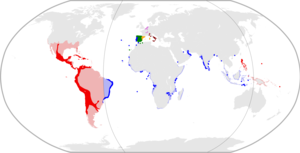Consejo de Aragon

The Consejo Supremo de la Corona de Aragón ( Consejo Supremo de Aragón or Sacro Supremo Consilio Aragoniae Coronae , short: Consejo de Aragón ; German: Aragón Council ) was a 1494 by Ferdinand II , Fernando II el Católico , representative of the Crown of Aragón , Corona de Aragón , established permanent body or council assembly. The council set up for the Crown of Aragón was a collegial authority which at the same time independently carried out government and administrative tasks. He had his permanent seat in Madrid . The Consejo de Aragón administered the Kingdom of Aragon, the Principality of Catalonia (including Roussillon until 1659), the Kingdom of Valencia , the Kingdom of Mallorca and Sardinia , as well as the Aragonese possessions in later Italy, the Kingdom of Sicily and Naples , until these then from 1558 got their own administrative agency through the creation of the Consejo de Italia .
The Consejo de Aragón was composed of a vicecanciller exercising the presidency and then four lawyers for whom the name Regentes was used, the Tesorero general , a fiscal and the Protonotario .
Background: In 1469 Ferdinand II of Aragón married the Castilian heiress Isabella I of Castile ( Corona de Castilla ), who then ascended the Castilian throne in 1474. Five years later, in 1479, Ferdinand II also inherited the Catalan-Aragonese crown. Both kingdoms were now united in a dual monarchy. After Isabella's death in 1504, Ferdinand II of Aragón entered into another marriage in 1509. When Ferdinand died in 1516 without leaving a direct male descendant, the kingdoms of the Crown of Aragón fell to Ferdinand's grandson, King Charles I of Spain , who from then on also ruled Castile for his supposedly incapable of governing mother Johanna. Under the Catholic Monarchs , the first central councils were set up, some of which were responsible for specific areas, some for the affairs of individual rulers, such as the Aragon and Castile Councils, which were later joined by the Council of India (founded before 1524) Italy Council (1559), the Portugal Council (1582) and the Flanders Council (1588) were put aside.
Under Charles I, who later became Charles V, remarkable streams of rationalization and bureaucratisation were promoted, the foundations of which, of course, had already been laid by the Catholic Kings; in particular from the tradition of the Aragonese advisory bodies of the kings Consejos Reales . The Consejo Real Catalan Consell Reial de la Corona d'Aragó was an institution that had existed since the 13th century and, as a personal advisory body to the king, gathered the holders of the most important court offices: the Canciller (comparable to the Chancellor ), the Mayordomo (comparable to the Court Marshal ), the Camarero (comparable to the Chamberlain ), the Maestre racional (comparable to the Chancellor of the Exchequer ) and the highest military commanders.
literature
- Klaus Herbers: History of Spain in the Middle Ages: from the Visigoth Empire to the end of the 15th century. W. Kohlhammer Verlag, Stuttgart 2006, ISBN 3-1701-8871-2
- Margarita Ortega López: El Consejo Supremo de Aragón y la supervisión de la justicia del reino aragonés durante el siglo XVII. MANUSCRITS, nP 8, Enero 1990, pp. 139-162
Web links
- Paul Dvořak, BA: Assemblies of Estates in the lands of the Crown of Aragon in the early modern period. University of Vienna, Master's thesis, Vienna 2012
- Manuel Rivero Rodrlguez: El consejo de Aragón y the fundacion del consejo de Italia. Pp. 57-90
Individual evidence
- ↑ Theodor Schieder, Josef Engel: The emergence of modern Europe. Handbook of European History Klett-Cotta, Stuttgart 1994, ISBN 3-1290-7550-X
- ↑ Joseph Perez: Ferdinand and Isabella . Callwey, Munich 1989, ISBN 3-7667-0923-2 , pp. 142 (from the French by Antoinette Gittinger).
- ↑ Consejo de Aragón In: Gran Enciclopedia Aragonesa OnLine, last updated November 19, 2008 [1] | Retrieved July 14, 2015 (Spanish).
- ^ Jon Arrieta Alberdi: El Consejo Supremo de la Corona de Aragón 1494-1707. Institución "Fernando El Católico", Zaragoza 1994, ISBN 8-4782-0217-X , pp. 72, 76
